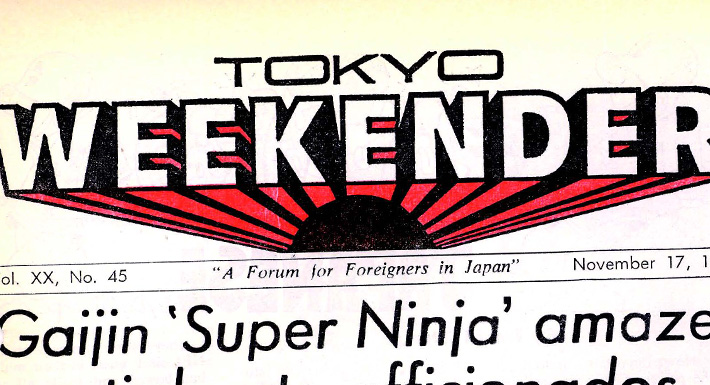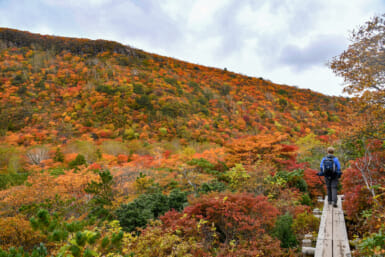In 2010 Tokyo Weekender celebrates forty years as our city’s leading English magazine. Founded in 1970 by two pioneering journalists, Weekender was the very first English magazine in Tokyo, bringing news, happenings, and musings to the expat community.
To this day Weekender keeps alive the legacy and dreams of co-founders Corky Alexander and Susan Scully by publishing articles by the city’s best international writers on a wide variety of current and relevant topics. For this special anniversary issue we asked longtime Tokyo residents, former and current writers, and friends of the founders to share their thoughts on the history of Tokyo and Weekender over the past forty years.
To accompany this, we are reprinting some of the best Weekender articles from the past four decades so that readers can see the evolution of the magazine for themselves.
Corky was a great and unique person. As we go down our life’s path we very rarely encounter such remarkable individuals as Corky Alexander.
-Carl Kenneth Smith, longtime friend of Weekender Co-founder Corky Alexander
Since arriving in Japan in 1969, I have seen many changes in Tokyo: businesses one would think would be here forever, but were gone in a few years; IBM having a lot of expats here during those years and very few at the moment; the 80s being great years for the Japanese economy and stock market (I wish I had bought more)… Japanese investors were buying up land in Hawaii, and people in Washington were smashing Sony TVs. I remember when Minoru Mori starting buying up plots of land to build Roppongi Hills, and then the bubble burst and people wondered why he continued to do it. And of course there was the Kobe quake in 1995 and the way it changed peoples lives. Meeting Corky Alexander when he ran the Weekender and making friends with one of Japan’s icons was truly memorable. At that time Weekender was a very popular foreign tabloid and we all looked forward to its next edition. Hopefully those of us that live here will see the Weekender once again as it was in the past—Tokyo’s leading weekly magazine.
–Joe Lestage, 41-year Tokyo resident
It is indeed 40 years since Cork hit the dance floor with Weekender. Bear in mind, gentle readers, that he did so with a founding partner. She was Sue (nee Dibble) Scully, and she was a force. So there were two of them as founders. Susan—lest we forget—was the daughter of a Tokyobased United Press International (UPI) editor, Arnold Dibble. Both dad and daughter have moved on in the press of time (Arnie must have joined the choir). But let us say that Sue’s presence at the top of Weekender was as essential to the founding moment as Cork’s. Quite quickly Cork and Sue—and this took four years—reached a parting of ways. Still, Sue was there at the creation. Should you read this, Sue, wherever you are in the US, be in touch…
That said, what was it about the Weekender formula that prevailed, those 40 years ago? To my mind it was Cork’s movie reviews. The reason I started a column for Cork was that I loved his stuff. He wrote like the proverbial angel—of the Texan variety—with yards of humor. I chuckled over his reviews. Mind you, I never accompanied him to a film showing. He preferred, he said, to see movies alone. He was serious about his calling. His columns set the tone of the paper, honest to God. So it was with Cork and his screwball Weekender publication (note that ‘screwball’ was an expression often heard from Cork).
How would Cork run the paper, if he were with us today? He would have made it look a lot scruffier than it does now. Sort of beat up. He would have had Wayne Graczyk sitting opposite him in the office—as Wayne did for roughly 30 years—receiving Bill Hersey’s handwritten copy and deciphering his scrawl (the only person in the office who could do so). And he would have preserved my column in aspic, never changing a word. In one of the last pieces I wrote for him—this would have been the early spring of 2002, just as the military-industrial complex was about to unleash itself on Iraq—I compared Bush and partner (Blair) to Tweedledum and Tweedledee.
How I wish, selfishly, that Cork had lived. I wanted him to keep running the column. Often enough, as it happens, I stroll by the building— a block of flats in Roppongi—where Cork had his heart attack. I never fail to utter upwards a salaam!
–Henry Scott Stokes, longtime Tokyo resident and Weekender contributor
Decades of changes, yet much remains unchanged. Salary man pins OUT, fathers holding their children in public IN. Terakura OUT, Mixi IN. Massive national debt…well, no change actually. Throughout it all Weekender has been there. I like the new look and feel.
–Jon Sparks, 13-year Tokyo resident
I can honestly say that I find it difficult to believe that I’ve written columns for the Weekender for 40 years. As the song goes (and my dear grandmother used to say), “My how the time goes by.” I remember clearly going and talking to Corky Alexander about a column when he first started the paper. He thought it was a good idea, and for about the first year I wrote mostly about fashion in a column called “Bill Hersey’s Shopping Bag,” plus a bit of travel and a few parties. At that time I was very much into fashion. I was fashion editor at two Japanese mens’ magazines, and kept busy modeling (there weren’t many agencies back then), producing fashion shows, designing my own menswear line (which had outlets in five major department stores), and at one time I even had a small boutique on Aoyama-dori where the Peacock supermarket is now.
I got kind of bored with fashion, so I went into client relations for the now 30-year-old Lex club in Roppongi, did a lot of TV work, and also traveled pretty much all over the world. Corky, kind and considerate as always, felt I was making the right choice in wanting to change my column from a shopping guide to a social column. I ended up covering all kinds of events here in Tokyo, as well as around the world. I really enjoyed writing travel stories, and thanks to the Weekender I did stories that took me to many places like Austria, Mexico, the Philippines, and the UK, as well as more unusual destinations like Djibouti, Saudi Arabia, Papua New Guniea, and Tahiti. My work with the Weekender also got me some awesome invitations to special events all over the world. These included Coca-Cola’s 100th anniversary five-day celebration in Atlanta, Georgia; Madame Jehan Anwar el Sadat’s four-day charity event in and around Cairo, at which Frank Sinatra gave a concert in front of the sphinx and pyramids; an opening party at the Loews Hotel in Monte Carlo, where I met Princess Grace (God bless her soul) and the legendary Lena Horne.
Thanks to the Weekender and a lot of great friends, I’m sure I’ve been to about as many parties as anyone. I had the privelege of being included in an article on the top ten social columnists in the world in a prestigious European magazine, and also helped with the Japan section of Lord Lithchfield’s Book of the Best, which was published annually for several years in the UK. All of this, plus my regular column in the Weekender, has given me the opportunity to meet and get to know so many interesting people from all walks of life and from all over the world. I am currently working on a book about many of these people, and hopefully will finish it in 2010. These people include Nelson Mandela, most of the Japanese prime ministers from the last 40 years, US Presidents Nixon, Carter and Ford, and many other world leaders. From the film world I have partied with Elizabeth Taylor, Johnny Depp, Brad Pitt, Leonardo de Caprio, Jean Reno, Robert de Niro, Jodie Foster, and countless others. It’s pretty much been the same with the music, dance and fashion worlds. I thank God every day for my blessings and feel the Weekender, Lex and friends have really been the foundations for a really great lifestyle. Once again people, parties and places, and being pretty much able to do what I want when I want to do it, really make it all worthwhile. My philosophy of life is that one should do what they want, as long as they don’t hurt others. My association with the Weekender has helped me with all this and more.
–Bill Hersey, longtime Weekender columnist
It was December 3, 2002. Barbara Allen had asked me to sing at a Christmas party at the Roppongi home of Tokyo Weekender editor Corky Alexander’s daughter. A few years before I had started translating a genre of traditional Japanese children’s songs called doyo. Since the songs appeal to adults in Japan as much as children, I decided to sing a few of the songs and then sing some Christmas songs for the festive occasion.
When Corky arrived, his face lit up to see his granddaughters all dressed in pretty little princess outfits. His daughter had made a mouthwatering feast. His wife, Mary was there along with many of his long time Tokyo friends. It couldn’t have been a happier gathering at the beginning of the evening. Corky was dressed in a beautiful jacket with a red silk tie. His snow white frosty hair and his warm laugh reminded many of us of Santa Claus himself.
Since it seemed to be a really important night for Corky, I remember wanting to really do my best at singing the songs and hopefully moving everyone with the beautiful lyrics and melodies. When I was asked to perform, I sang Dragonflies, or Akatombo. Everyone oohed and ahhed after the song and I was relieved that they were enjoying the music. Then I sang the beautiful Japanese song called Come Walk Along the Shore, or Hamabe no Uta. The song tells a story of remembering a loved one who has passed away as you are walking along the seashore. Corky had his arm around his daughter as he listened to the song and was surrounded by his angelic looking grandchildren. When I finished the song, Corky turned to his family and said, “That was beautiful.”
Those were the last words that our dear friend and Weekender editor ever said. He suddenly fell backward and lost consciousness. Barbara Allen’s husband Roger tried desperately to revive him as panic fell over the party. The festive occasion turned into a tragic event.
Afterward, I left the party shaken and walked down Roppongi-dori, thinking that I had to find Bill Hersey and tell him the sad news. Fate had it that Bill was walking up the street and we ran right into each other. We went and sat in Bill’s well-known red BMW and shared stories about Corky. Afterward, I had mixed feelings about being the person singing there on the night that Corky left us all. But later a friend set my mind at ease. She told me, “Corky was there at a party, which he loved, surrounded by his best friends and treasured family members. He was totally enjoying himself when he passed away. And his last words on this earth were, ‘that was beautiful.’” We should all be so fortunate.
–Greg Irwin, local personality and noted doyo singer
It was just by chance that I came to Japan for the first time, and I did not know then that my life was predestined to be closely related for a long time to this amazing country and its wonderful people. I came with my wife in the winter of 1977. Japan was involved in a frantic race to consolidate the structure of its economic development plan, which was started after the war. Although our life in the East capital was full of pleasant experiences and surprises, we were exhausted after a daily struggle with the language barrier, culture differences, and the rarity of Japanese customs and food.
However, we were lucky enough to find a haven of Western culture and logic in that sea of insanity. We found the Tokyo Weekender for the first time while shopping at the National Azabu Supermarket. Then we became its assiduous readers, picking it up in several selected stores in the city. The Weekender was a great help to us for finding medical assistance, amusement places and schools for our two children. We used to read its editorials and reports on interesting aspects of the Japanese way of life, wisely written from a foreign outlook by unforgettable writers such as Millard (Corky) Alexander, its former owner and editor, who also reported on Japanese social and economic aspects in many Weekender series, such as the business “Success Stories.” I have been very happy to see that Bill Hersey is still as active as always, attending social gatherings and reporting about them in his “Parties, People & Places” pages.
The early Weekender of the 70s and 80s contained essays that analyzed the ways of life in the Tokyo of the post-war decades, the giant city with an overwhelming population, where everybody is in a hurry and in a constant working frenzy. The city was and still is a terrific mixture of architectural styles. It was the Tokyo that puzzled foreigners with its impenetrable language, but enraptured them at the same time with the politeness of its inhabitants and the gracefulness of school children in old Prussian uniforms.
Many things have changed in Tokyo and Japan over the recent decades. Progress has been fueled by the advent of digital technology and its applications in electronics, communication systems, information technology, and the internet. Ubiquitous networks of radio systems pervade every city corner in order to allow the operation of cellular phones. New modern buildings with startling architectural shapes and structures are being built everywhere. Subway and train systems are still being refined, and new and deeper subway stations are being constructed. Although many of the mysteries of the way of life in Tokyo have become more easily unravelled thanks to modern electronic translation devices, Tokyo still is an enigmatic place where foreigners will be bewildered.
The present Tokyo Weekender has developed in its format from its former black and white pages to a colorful, modern magazine. It has a new team of essayists who analyze the same issues as before, with an enlarged scope that encompasses the technological development and social evolution that has affected Japan in recent decades. However, nowadays it keeps the same spirit of the past. Its writers are still voyagers in a society which maintains its mystique, in spite of modern internationalization trends. Their essays still contain the same wise insight on Japanese issues, and are guidance for their fellow foreigners, helping them to overcome the cultural shock of living in this weird but wonderful city that they have chosen as a temporary or permanent home.
–Jorge Pazmino, former longtime Tokyo resident and Weekender reader















